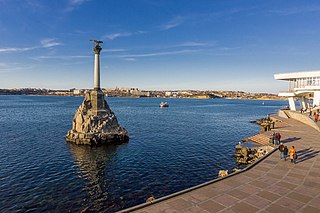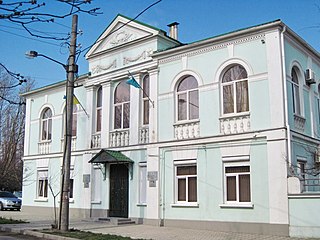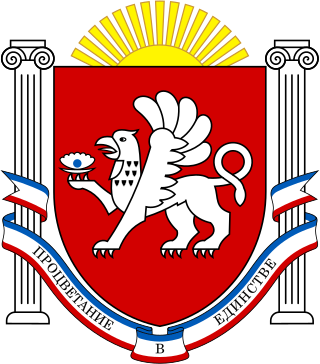
Sevastopol, sometimes written Sebastopol, is the largest city in Crimea and a major port on the Black Sea. Due to its strategic location and the navigability of the city's harbours, Sevastopol has been an important port and naval base throughout its history. Since the city's founding in 1783 it has been a major base for Russia's Black Sea Fleet, and it was previously a closed city during the Cold War. The total administrative area is 864 square kilometres (334 sq mi) and includes a significant amount of rural land. The urban population, largely concentrated around Sevastopol Bay, is 479,394, and the total population is 547,820.

Russia is divided into several types and levels of subdivisions.

The administrative divisions of Ukraine are under the jurisdiction of the Ukrainian Constitution. Ukraine is a unitary state with three levels of administrative divisions: 27 regions, 136 raions (districts) and 1469 hromadas.

The Mejlis of the Crimean Tatar People is the single highest executive-representative body of the Crimean Tatars in period between sessions of the Qurultay of the Crimean Tatar People. The Mejlis is a member institution of the Platform of European Memory and Conscience.
The politics of Crimea today is that of the Republic of Crimea on one hand, and that of the federal city of Sevastopol on the other, within the context of the largely unrecognised annexation of Crimea by the Russian Federation in March 2014.

Pavlo Valentynovych Lebedyev is a Ukrainian and Russian financier and businessman. Member of the Board of Russian Union of Industrialists and Entrepreneurs (RUIE). Head of Coordination Council of the Crimean branches of RUIE. Minister of Defense of Ukraine. People's Deputy of Ukraine of three convocations. While officially still being Ukraine's Defence Minister Lebedyev moved to Crimea and stayed there amidst the 2014 Russian annexation of Crimea from Ukraine. Since 14 March 2016 he is wanted by the General Prosecutor's Office of Ukraine on suspicion of criminal activities and desertion.
The Crimean status referendum of 2014 was a disputed referendum on March 16, 2014, concerning the status of Crimea that was conducted in the Autonomous Republic of Crimea and the city of Sevastopol after Russian forces seized control of Crimea.
The annexation of Crimea by the Russian Federation took place in the aftermath of the 2014 Ukrainian revolution. On 22–23 February, Russian President Vladimir Putin convened an all-night meeting with security services chiefs to discuss pullout of deposed President, Viktor Yanukovych, and at the end of that meeting Putin remarked that "we must start working on returning Crimea to Russia.". Russia sent in soldiers on February 27, 2014. Crimea held a referendum. According to official Russian and Crimean sources 95% voted to reunite with Russia. The legitimacy of the referendum has been questioned by the international community on both legal and procedural grounds.

The Autonomous Republic of Crimea is an administrative division of Ukraine encompassing most of Crimea that was annexed by Russia in 2014. The Autonomous Republic of Crimea occupies most of the peninsula, while the City of Sevastopol occupies the rest.

In February and March 2014, Russia invaded the Crimean Peninsula, part of Ukraine, and then annexed it. This took place in the relative power vacuum immediately following the Revolution of Dignity and was the first act of the wider Russo-Ukrainian War.

The Republic of Crimea is a republic of Russia, comprising most of the Crimean Peninsula, but excluding Sevastopol. Its territory corresponds to the Autonomous Republic of Crimea, a subdivision of Ukraine. Russia occupied and annexed the peninsula in 2014, although the annexation remains internationally unrecognized.

United Nations General Assembly Resolution 68/262 was adopted on 27 March 2014 by the sixty-eighth session of the United Nations General Assembly in response to the Russian annexation of Crimea and entitled "territorial integrity of Ukraine". The nonbinding resolution, which was supported by 100 United Nations member states, affirmed the General Assembly's commitment to the territorial integrity of Ukraine within its internationally recognized borders and underscored the invalidity of the 2014 Crimean referendum. Eleven nations voted against the resolution, while 58 abstained, and a further 24 states were absent when the vote took place.

The Sevastopol City Council is the unicameral legislature of the Ukrainian city of Sevastopol. The Council is composed by 76 members.

The Directorate of the Ministry for Internal Affairs in Sevastopol City or the Police of Sevastopol City has been the main law-enforcement agency in the government of Sevastopol since March 2014 after Russian forces seized Crimea and Sevastopol and unilaterally dissolved the local Ukrainian Militsiya of Sevastopol.
The Crimean problem or the Crimean question is a dispute over the status of Crimea between Ukraine and Russia. The dispute began during the dissolution of the Soviet Union, but did not escalate into a conflict until the 2014 Ukrainian revolution, when Russian special forces were deployed to occupy Crimea and took over its government buildings. The official results of an internationally unrecognized referendum held during the occupation indicated overwhelming support for Russian annexation. The Crimean parliament and the autonomous city of Sevastopol unilaterally declared independence from Ukraine to ideally form a country named Republic of Crimea. Russia then annexed the region and created two federal subjects, the Republic of Crimea and Sevastopol. Ukraine and the majority of the international community continue to regard Crimea as occupied Ukrainian territory; a United Nations General Assembly resolution declared the referendum invalid and affirmed the territorial integrity of Ukraine. Despite international opinion however, the currency, tax, time zone and legal system are all operational under de facto Russian control. Ukraine has attempted to resolve the matter by filing litigation in multiple international criminal, environmental, political, and other courts.
Parliamentary elections took place in the Republic of Crimea on 14 September 2014. These were the first elections since Crimea's illegal annexation by the Russian Federation on 18 March. The outcome was an overwhelming victory for President Vladimir Putin's United Russia party.

The Head of the Republic of Crimea is the highest official and the head of the executive power of the Republic of Crimea; an internationally disputed federal subject of the Russian Federation located on the Crimean Peninsula.

The coat of arms of Sevastopol is a heraldic symbol representing the city of Sevastopol, Crimea. It is featured in the middle of the flag of Sevastopol on a red background.

Dmitry Anatolyevich Belik is a Russian politician who is currently a member of parliament in the State Duma of the VII convocation, a member of the United Russia party, and a member of the State Duma committee on control and regulations and a member since 5 October 2016.















